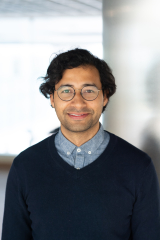10th Year Anniversary Session
Register
Date: Monday, September 14, 2020
Time: 1 - 3 PM, Eastern Time
Overview:
This year marks the 10th year of awarding an IPN student with the Ann and Richard Sievers Award in Neuroscience! Over the last 10 years, we are proud to have disbursed this award to our senior Ph.D. students for their academic excellence and research potential - all unique and distinguished in their own ways.
For this special anniversary session, all 10 of our award recipients will come together, discuss their research projects, explain their academic and career trajectories, and take questions from our audience. We will also be joined by Marc Sievers himself - the foundational support of the Ann and Richard Sievers Award in Neuroscience.
Presenters/Recipients:
2020
 Reinder Vos de Wael, M.Sc.
Reinder Vos de Wael, M.Sc.
(PhD Candidate, Montreal Neurological Institute and Hospital, McGill University)
Reinder started working on fMRI data processing early in his academic career with a Bachelor’s thesis on the shape of population receptive fields in human visual cortex, and a Master’s thesis on statistical methods of fMRI preprocessing. Since January 2017, Reinder is pursuing a PhD on the relationship between connectivity and tissue microstructure of the temporal lobe. Furthermore, Reinder develops open-access toolkits for advanced analyses of MRI-derived connectivity data.
2019
Scott Bell, Ph.D.
2018
Thomas Funck, Ph.D.
2017
 Andrew Kaplan, Ph.D.
Andrew Kaplan, Ph.D.
(Staff Scientist, Discovery Biology, Yumanity Therapeutics, Boston MA)
Andrew completed his PhD in Dr. Alyson Fournier’s lab at the Neuro, where he conducted research on axon regeneration. He subsequently undertook postdoctoral work in the lab of Dr. Clifford Woolf at Harvard Medical School, before joining Yumanity Therapeutics in 2019 as a staff scientist. At Yumanity, Andrew is working on discovering drugs to treat neurodegenerative diseases, including Parkinson’s and ALS.
2016

![]() Sujaya Neupane, Ph.D.
Sujaya Neupane, Ph.D.
(Postdoctoral fellow, Department of Brain and Cognitive Sciences, Massachusetts Institute of Technology)
Sujaya Neupane is a postdoctoral fellow investigating how humans and animals make relational inference such as recalling sequence of events from memory or inferring distance between landmarks from the mental map of a city. He did his PhD at the Montreal Neurological Institute with Dr. Daniel Guitton and Dr. Christopher Pack studying eye movements and visual perception in primates. During the last year of his PhD he was awarded the Seivers award which enabled him to pursue an educational project in his home country Nepal in an effort to develop a graduate research program in computational neuroscience. As a part of this endeavour, he is currently co-funded, along with Dr. Christopher Pack, by the International Development Research Centre to run a vision restoration project at an eye hospital in Kathmandu.
2015
 Maria S. Ioannou, Ph.D.
Maria S. Ioannou, Ph.D.
(Assistant Professor, Dept. of Physiology, Faculty of Medicine & Dentistry, University of Alberta
Adjunct Assistant Professor, Dept. of Cell Biology, Faculty of Medicine & Dentistry, University of Alberta
Member, Group on Molecular and Cell Biology of Lipids, University of Alberta
Member, Neuroscience and Mental Health Institute, University of Alberta)
Maria obtained her BSc and MSc studying neurotrophins with Dr. Margaret Fahnestock at McMaster University. She completed her PhD training with Dr. Peter McPherson as an IPN student at McGill University. Her work using fluorescent biosensors to study the spatiotemporal activation of Rab GTPases was supported by an Ann and Richard Sievers Award. Maria completed her post-doctoral training with Drs. Zhe Liu and Jennifer Lippincott-Schwartz at the HHMI Janelia Research Campus where she studied lipid transport in the brain. Maria is now an Assistant Professor at the University of Alberta, where she is continuing this exciting line of work.
2014
 Martin Munz, Ph.D.
Martin Munz, Ph.D.
(Postdoc, Institute of molecular and clinical ophthalmology Basel (IOB), Switzerland)
Martin was born and grew up in southern Germany and completed a bachelor degree in biology in Bonn and Levanger Norway. After his bachelor’s, he completed a master's at the Charite Berlin with Michael Brecht. Following this, he moved to Montreal where he finished a PhD in the lab of Edward Ruthazer at the Montreal Neurological Institute. Currently, he is a postdoc in the lab of Botond Roska In Basel Switzerland where he works on questions regarding the development and function of cortical circuits.
2013
 Vedrana Cvetkovska, Ph.D.
Vedrana Cvetkovska, Ph.D.
(Research Associate, Department of Psychology, McGill University)
Dr. Vedrana Cvetkovska received a PhD in Neuroscience at McGill University in 2015 for her work on molecular mechanisms of synaptic targeting in Dr. Brian Chen’s lab. She did a first post-doctoral fellowship with Dr. Ann-Marie Craig studying synaptic development at the University of British Columbia. In 2019 she returned to McGill to join Dr. Rosemary Bagot’s lab where she is integrating her molecular expertise with circuit-level analysis and behavioral models of depression. Her current research focuses on transcriptomic changes that occur in response to stress.
2012
 Jennifer Sarah Goldman, Ph.D.
Jennifer Sarah Goldman, Ph.D.
(Postdoctoral fellow, supervised by Drs. Alain Destexhe and Viktor Jirsa, European Institute for Theoretical Neuroscience, Centre national de la recherche scientifique (CNRS), France)
Always interested in humanity, Jennifer began studying philosophy, literature, psychology, political and social science. Discovering the wealth of emerging tools and creativity required for neuroscience, she finished undergraduate studies with a Major in Humanities and Minor in Neuroscience. During her PhD, Jennifer researched brain development and degeneration, using methods in cell and molecular biology, pharmacology, microscopy, and electrophysiology. Next, she pursued postdoctoral studies in human neuroimaging, to understand global neural dynamics. Finding a substantial gap in our understanding between microscopic and macroscopic neural processes, she now produces computational models and theory needed to connect knowledge across brain scales.
2011
 Jesse Jackson, Ph.D.
Jesse Jackson, Ph.D.
(Assistant Professor, Department of Physiology, Faculty of Medicine and Dentistry, University of Alberta)
After completing his degree in the IPN at McGill, Jesse completed postdoctoral fellowships at Columbia University, and Janelia Research Campus. He opened his laboratory at the University of Alberta in 2018. Jesse's group is interested in the cell types and neural circuit mechanisms that the neocortex uses to perform innate memory functions.